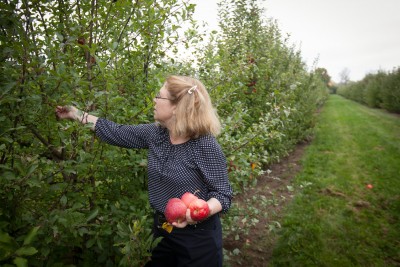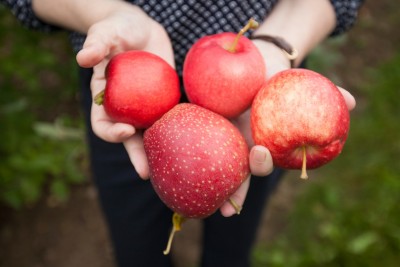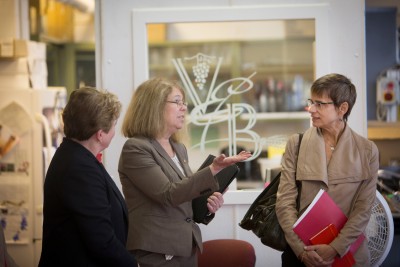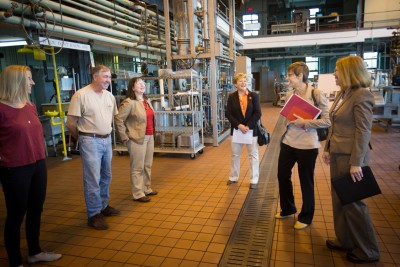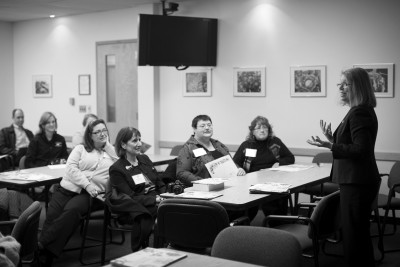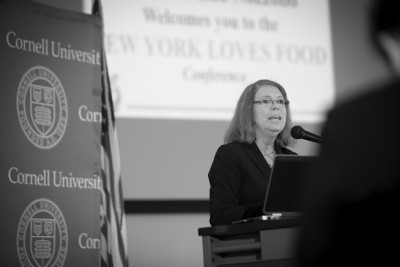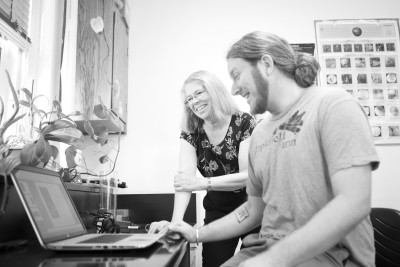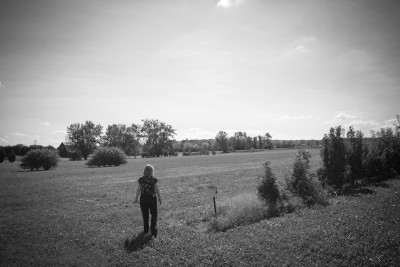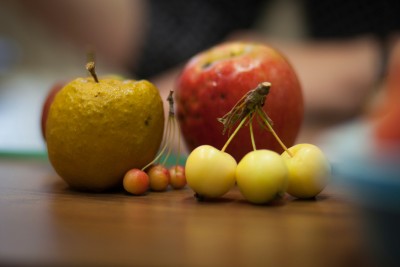Susan K. Brown oversees one of the largest fruit breeding programs on the planet, the logical, if not necessarily inevitable, extension of a lifelong passion for the plant world.
“I realized that with fruit breeding . . . you’re creating something that no one else has ever tasted.”
“I’ve always been fascinated with plants, I’ve always wanted to improve plants, so I’ve studied plants all my life,” says Brown, director of Cornell’s New York State Agricultural Experiment Station in Geneva, NY and a professor in the School of Integrative Plant Sciences (Horticulture and Plant Breeding and Genetics sections) in the College of Agriculture and Life Sciences. “You get to be an explorer, a jack-of-all-trades. You see things from a different perspective, and sometimes it’s great, sometimes it’s awful, but it’s always exciting and always changing.”
Brown, who was named the first Herman M. Cohn Professor of Agriculture and Life Sciences in 2006, manages a program that emphasizes genetic approaches to understanding and improving apple quality, including resistance to disease, nutritional value, and tree architecture.
Brown confesses that she was initially drawn to ornamental horticulture, but gradually became interested in fruit breeding. She gestures toward a tray on her desk piled high with a dazzling variety of cultivars. There are apples whose shadings evoke nectarines, greenish apples dappled with tiny bumps, apples the size of cherries, and the familiar Granny Smith, Red Delicious, McIntosh, and Honeycrisp varieties.
From left to right: Susan K. Brown, director of Cornell’s New York State Agricultural Experiment Station in Geneva, N.Y., examining apples in one of the station's orchards; Despite their varied appearance, these four apples have the same parents; President Elizabeth Garrett (right) tours the Vinification & Brewing Technology Laboratory on the Geneva campus with Dean Kathryn Boor of CALS and Susan Brown; Garrett, Boor, and Brown talk with employees at the Pilot Plant at the Geneva campus.
“I was trained to develop new ornamentals, but I wanted something that was beautiful and also benefited people beyond just making their gardens pretty,” she says. “I realized that with fruit breeding . . . you have beautiful flowers in the spring, and you’re creating something that no one else has ever tasted.”
Since 1880, Cornell scientists have introduced 280 new fruit varieties, including 66 apple varieties, 55 grape varieties, 42 strawberry varieties, and 41 raspberry varieties.
In 2010, Brown ushered through the first licensing agreement between Cornell and a newly formed grower cooperative, the New York State Apple Growers (NYAG) LLC, which will streamline the commercialization process and increase the return on investment for the College of Agriculture and Life Sciences. In 2013, Brown introduced two new varieties of apples, to be commercialized in partnership with NYAG: SnapDragon™ and RubyFrost™. Although their availability is limited at present, both varieties have drawn praise from growers and consumers (as well the attention of the New York Times and the Wall Street Journal).
Brown sees the agreement with the grower cooperative as but one example, among many, of the experiment station’s value to the citizens of New York State, particularly its economic impact. Another strength is the variety and depth of the research at the NYSAES.
“We emphasize research on specialty crops, so all the foods that are good for us, fruits and vegetables, we make them better for consumers,” says Brown. “We have breeding programs on grapes, small fruits, and vegetables. We have a researcher who is working with a candy company. This vegetable breeder has radishes and beets that may provide natural colors for candies, as opposed to the use of artificial dyes.”
Since 2000, the Food Venture Center at the New York State Agricultural Experiment Station in Geneva, NY has helped 2,100 entrepreneurs in the commercialization of 7,800 food products, contributing to the creation of an estimated 800 full-time jobs.
“We have scientists who are developing willows for biofuel,” she continues. “We have scientists who spend their time determining how best to let a tree get sunlight. That sounds basic, but in everything that we do with fruit and vegetable production we’re trying to harvest the sun—because sunlight is developing the flavors and the nutritional properties often tied to fruit and vegetable colors.”
Brown became the Goichman Family Director of the experiment station in January 2015, which brought new responsibilities and demands upon her time. The Geneva station encompasses 900 acres of fields, orchards, vineyards, and laboratory and research space, including Brown’s outdoor workshop, a 50-acre apple orchard of such breathtaking variety it’s been called “the botanical version of Noah’s Ark.” Brown confesses that her first few months as director were challenging but she is upbeat about her role and positive developments at the station, such as the state boosting funding for the Food Venture Center, the New York Loves Food summit meeting in October 2015, and Cornell President Elizabeth Garrett’s first visit to Geneva.
“I feel like I’m hitting my stride, I’m able to make a difference,” she says. “We’re getting some grants, we’re getting some new equipment, so I’m glad that I am where I am.”
Without hesitation, Brown says the best part of her job is its diversity.
In 2014 alone, the Food Venture Center responded to more than 2,500 inquiries for assistance on marketing food products, worked with 391 entrepreneurs who needed safety evaluations of 1,030 specialty products and processes for commercial production, and analyzed 774 samples of food prototypes to address their safety and technological feasibility.
“I have the opportunity to try research that no one has tried before. Consumers like apples, so there’s a lot of interest in the crop. I have the opportunity to work with apple growers, one of the best groups of individuals ever,” says Brown. “I get to work with grad students and undergrads. I’m doing what I love, and I’m adding new products that are going to be better for consumers. Hopefully we produce apples with better flavors, higher vitamin C, and better textures, and we have kids eating and enjoying more apples.”
Facts and Figures about Susan K. Brown
| Residence | Geneva, NY |
|---|---|
| At Cornell | Faculty member since 1985 The Goichman Family Director, New York State Agricultural Experiment Station Herman M. Cohn Professor of Agriculture and Life Sciences |
| Accomplishments | Inventor of four varieties of apples Co-inventor of 10 varieties of sweet cherries and one tart cherry variety 2014 NY Senate Woman of Distinction 2013 SUNY Chancellor’s Award for Excellence in Faculty Service 2012 CALS Alumni Association Outstanding Faculty Award |
| Education | BS, University of Connecticut MS, Rutgers University PhD, University of California, Davis |

